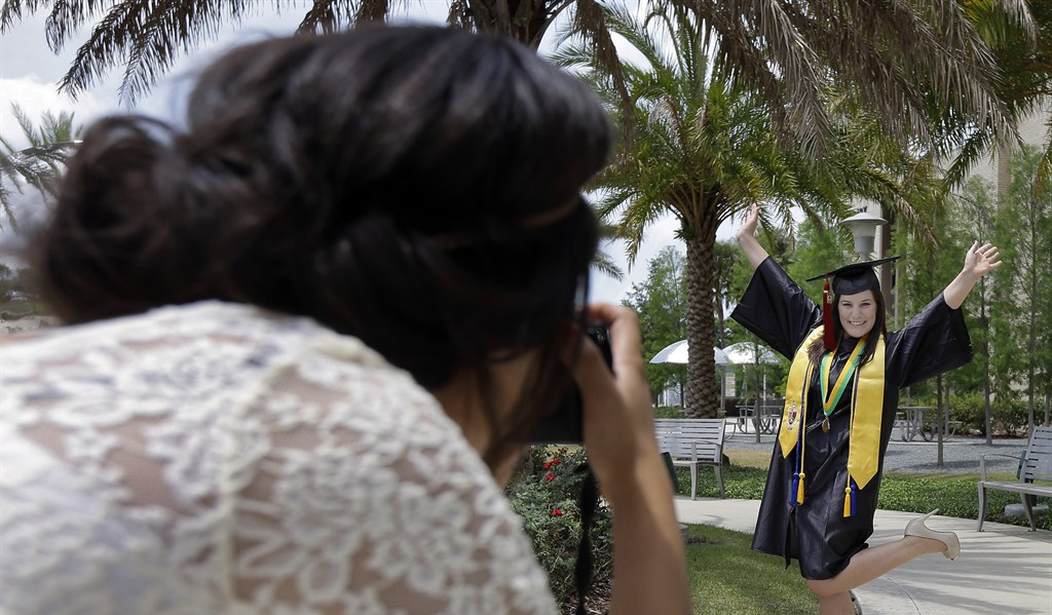We are about two months out, give or take, from graduation season. Soon, millions of high school students will don caps and gowns and perhaps in some benighted districts, masks, to troop down the aisle of their high school auditorium, gymnasium, local arena, or other venue. Each of them will receive a handshake and a diploma that will end up in a box in the garage. Then, they will have a choice. They may choose to go to a trade school and learn a useful skill. Or they may opt to move from the woke, gender-driven, Svengali-esque environs of high school to the woke, gender-driven, Svengali-esque environs of college.
With a few exceptions, college degrees these days basically enable people to do post-graduate work in Barista Studies with an emphasis on Being Broke. Not that there’s anything wrong with being a barista, and I have known waiters and waitresses who were able to make bank at their jobs. But one does not need to wait four to five years and borrow tens of thousands of dollars to do that. In fact, college courses these days seemed designed to keep people impoverished. Or to keep them in college. Or both.
Related: Author Refuses to Play College Cancelation Kabuki
Case in point: the University of Maryland will offer a new minor this coming semester: “Creative Placemaking.” They probably should have just labeled it “Social Justice Internship.” The College Fix reported that the school’s website explained the minor this way:
Students in this interdisciplinary minor learn how artists and designers can play a vital role in advancing public dialogue,” and will “[explore] our shared humanity [while] addressing some of our major challenges,” according to the art department’s website. The new minor will help enrollees spark “conversations about racial injustice, inequitable development, climate change or celebrating the diverse communities and cultures around us.
Of note, the website was down when I checked the link.
The University told The College Fix that students:
…will learn how to employ techniques like mural design, storytelling, pop-up installations, public events and performance to advance a community’s vision and nurture vibrant place” and “will engage in place-based art and design projects in partnership with local organizations, knowledge keepers, and artists in select areas of Maryland, including the Purple Line Corridor.
A few of the courses that fulfill this minor are, “U.S. Latinx Literature and Culture,” “Diversity and the City,” “Changing Climate, Changing Cultures,” “Social Enterprise: Changing the World through Innovation and Transformative Action,” and “Public Policy and the Black Community.”
So, it’s activism 101. Or the classes could be 200 or 300-level courses. You’ll have to check the catalog.
But let’s say, dear prospective college student, that you decide to go into the sciences, say anthropology. You might become a researcher. You will probably become a perpetual grad student, or maybe a professor if you are lucky. But that does not mean that you will learn anything about the science of anthropology. Consider the following exchange between swimmer Riley Gaines and an anthropologist with a Ph.D. during her speech at the University of Pittsburgh:
.@Riley_Gaines_ to anthropologist: "If you were to dig up… 2 humans… 100 years from now, both man and woman, could you tell the difference, strictly off of bones?"
"No."
*CHAOS*
"I'm not sure why I'm being laughed at if I'm the expert in the room. … I have a PhD!" pic.twitter.com/YYW76ISevI
— Vince Coglianese (@VinceCoglianese) March 30, 2023
People have been using bones and skeletons to determine the sex of someone for years. Years. Back when educational channels used to show educational programs, you could see people do this all of the time. But, the anthropologist in question has an opinion, so he can ignore the facts and the science that make up his field of study. And because he has a Ph.D., what he believes to be true is “science.” In this case, he believes that there is no difference between male and female skeletons. I have news for you, Dr. Science: facts don’t care about your degree.
On the other hand, a college education with a minor in “Creative Placemaking” may be the perfect start on the way to the job of White House Press Secretary. Or even an anthropologist.










Join the conversation as a VIP Member